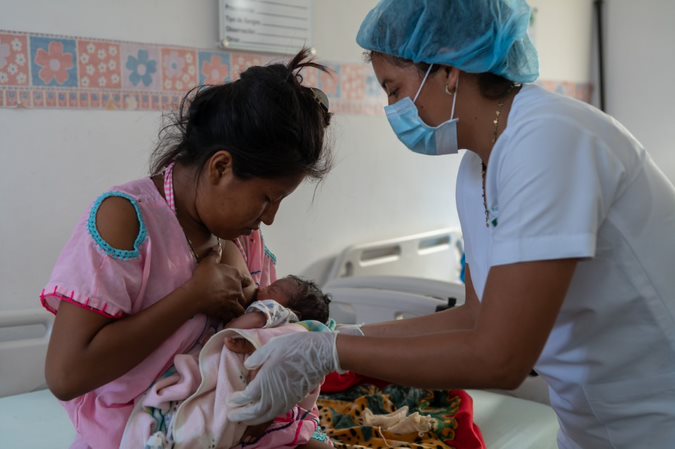While maternal deaths in Colombia as a whole fell from 70 to 51 per 100 000 live births between 2005 and 2019, they remain nearly five times higher in the country’s indigenous communities due to socioeconomic factors and cultural barriers to accessing maternal health services including language difficulties, fear of caesarian sections or a sense of shame at being helped by someone from outside the community.
Under the GAP, four signatory agencies – UNFPA, UNICEF, WFP and WHO/PAHO - have intensified their collaboration to help ensure equitable access to services and reduce maternal and neonatal mortality among indigenous peoples by working with the Ministry of Health and Social Protection, indigenous authorities and local government on health determinants, building on earlier joint work. According to Dr Gina Tambini, WHO/PAHO representative in Colombia, “an analysis of health gaps, inequities and cultural beliefs among indigenous communities was key in terms of setting priorities to develop emergency obstetric capacity and life-saving practices and adapt health services to meet indigenous people’s needs”.

A mother and newborn from the Wayúu indigenous community at Nazareth hospital, Colombia. ©Karen González Abril
Contributing to the overall strategy, UNICEF mobilized resources to ensure that newborns were prioritized in regional health plans, helped to raise standards of training in maternal nutrition for traditional practitioners and health teams and developed guidelines on adapting sociocultural services and maternal and perinatal care in the context of the COVID-19 pandemic. WFP supported national strategies to ensure food and nutritional security in Colombia with a specific focus on remote, dispersed communities, as well as broadening the expertise of midwives and raising community awareness about food and nutritional security in the first 1000 days of life. UNFPA helped to train community workers and traditional midwives in the Arhuaca and Wayuu communities, gathered evidence to guide new approaches to sexual and reproductive health and undertook advocacy to promote intercultural encounters and dialogue. WHO/PAHO has promoted action on the social determinants of maternal health in Colombia more broadly, based on Sustainable Development Goals 3 and 5, including by gathering evidence; rights-based tools and technical guidance;, dissemination of best practices; and inputs into strategic plans.
Colombia provides an example of organic growth arising from discussions about GAP accelerators and opportunities for greater collaboration at the country level. While the collaboration was initiated before the GAP, the GAP’s focus on determinants of health and Colombia’s specific interest in strengthening multisectoral approaches to address them has energized the collaboration, leading to the development of joint objectives and complementary interventions, enabled by tools and methodologies to identify determinants of health and better prioritize and target MCNH interventions.
Building on the collaboration, the four agencies now aim to work with the Government of Colombia and local communities to scale up the initiative to additional health areas and indigenous communities and support indigenous civil society and community mobilization on maternal, newborn and child health to ensure that they are not left behind and to expand their work on determinants of health and multisectoral approaches more broadly.
At the regional level, determinants of health has been identified as one of the most relevant GAP accelerators to support countries in an equitable recovery towards the health-related SDGs.
